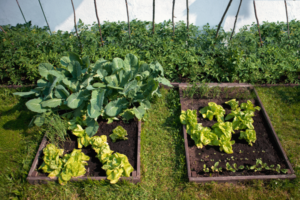Discover the secret behind lush gardens! Unleash the magic of mulch and unlock 7 surprising reasons your garden needs it!
Table of Contents
- What is Mulch?
- Enhancing Soil Health
- Weed Control and Suppression
- Nutrient Retention and Plant Growth
- Pest Management and Disease Prevention
- Aesthetics and Garden Enhancement
- Mulching Techniques and Best Practices
- Conclusion
Imagine stepping into a garden that looks like it’s been plucked straight from the pages of a home decor magazine. The plants gleam with vitality, the soil below is dark and rich, and the air is filled with the fragrance of nature. What’s their secret? It’s none other than mulch! Yes, that simple yet powerful layer of material spread over the soil offers a multitude of benefits to your garden.
What is Mulch?
Mulch can be described as a protective covering applied to the soil’s surface. It can consist of various organic or inorganic materials. Organic mulches, such as wood chips, straw, or compost, are derived from natural substances. Inorganic mulches, such as stones or rubber, do not break down over time. Both types of mulch play a valuable role in garden maintenance.
Enhancing Soil Health
The foundation of a thriving garden lies in healthy soil. Mulching offers numerous benefits that contribute to soil health. First and foremost, it acts as a shield against the elements. Mulch helps retain moisture in the soil, reducing the need for frequent watering. It also prevents soil erosion caused by heavy rain or wind, keeping valuable nutrients in place.
Moreover, mulch acts as an insulator for the soil, regulating temperature fluctuations. This protective layer keeps the soil warm during frosty nights and cool during scorching summer days. By creating a stable environment, mulch provides optimal conditions for plant root systems to flourish.
Weed Control and Suppression
Weeds can be a gardener’s worst enemy. They compete with your plants for essential resources like water, sunlight, and nutrients. Fortunately, mulch comes to the rescue as a formidable weed fighter. The dense layer of mulch obstructs sunlight from reaching weed seeds, effectively suppressing their growth. Over time, the mulch layer can smother existing weeds, preventing them from sprouting.
For maximum weed control benefits, proper mulching techniques are essential. Ensure that the mulch layer is thick enough (around 2-4 inches) to inhibit weed growth. Keep an eye out for any gaps or thin areas in the mulch and replenish as needed to maintain its weed-fighting effectiveness.
Nutrient Retention and Plant Growth
When it comes to garden success, adequate nutrient availability is paramount. Mulch assists in achieving this goal by preventing nutrient leaching. It acts as a protective barrier, slowing down the movement of water and nutrients away from the plant roots.
Furthermore, organic mulches break down over time, enriching the soil with organic matter. As the mulch decomposes, important nutrients are released into the soil, providing a constant source of nourishment for your plants. This steady supply of nutrients promotes healthy growth, vibrant foliage, and bountiful blooms.
Pest Management and Disease Prevention
Every gardener wishes to keep pests at bay and protect their plants from diseases. Mulching can contribute to these goals as well. Certain types of mulch, such as cedar chips or cocoa hulls, possess natural pest-repelling properties. These materials act as a deterrent, keeping insects like ants, slugs, or snails away from your precious plants.
In addition, mulch acts as a protective layer against soil-borne diseases. It creates a barrier that prevents pathogens from splashing up onto plant leaves or penetrating plant roots. By reducing the chances of infection, mulching plays a vital role in maintaining the overall health of your garden.
Aesthetics and Garden Enhancement
Beauty is in the eye of the beholder, and your garden’s appearance is no exception. Mulching not only offers a range of practical benefits but also enhances the visual appeal of your outdoor sanctuary. The layer of mulch provides a clean, finished look to your garden beds and borders.
Moreover, with a wide variety of mulch materials available, you have the opportunity to add a decorative touch to your garden. Opt for vibrant colored mulches to complement your plants or choose contrasting hues to create eye-catching focal points. Mulch can even be used to create walkways or define specific areas in your garden, adding a touch of artistry to the landscape.
Mulching Techniques and Best Practices
To maximize the benefits of mulching, it’s crucial to follow a few guidelines. First, clear the area of weeds and debris before applying mulch. This helps prevent weed growth and ensures a clean presentation.
Next, apply a layer of mulch approximately 2-4 inches thick. Be mindful not to pile the mulch directly against the plant stems or trunks, as this can promote moisture accumulation and rot. Leave some space around the base of plants to allow for proper air circulation.
When it comes to the frequency of mulching, it depends on the material used and its rate of decomposition. Organic mulches tend to break down faster, so they may require annual replenishment, while inorganic mulches can last for several years without intervention. Regularly inspect your mulch layer and top it up as necessary to maintain an effective coverage.
Conclusion
Mulching offers a multitude of benefits that can transform your garden into a thriving paradise. From improving soil health and weed control to enhancing aesthetics and aiding disease prevention, mulch is a must-have gardening practice. So, unleash the magic of mulch in your own garden and enjoy the bountiful rewards it brings!

